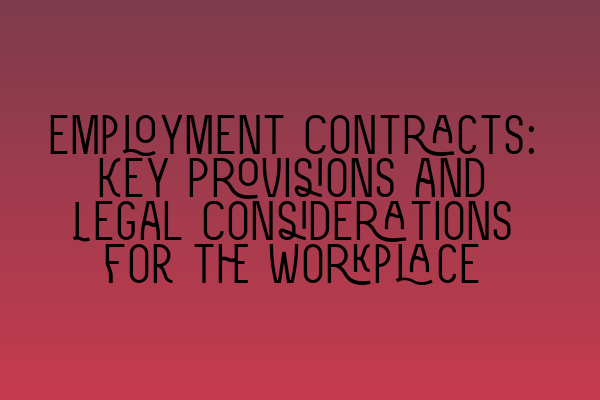Employment Contracts: Key Provisions and Legal Considerations for the Workplace
In today’s dynamic work environment, employment contracts play a vital role in setting out the terms and conditions of employment between employers and employees. These contracts are legally binding agreements that provide clarity and protection for both parties involved. It is essential for employers and employees alike to understand the key provisions and legal considerations that should be included in an employment contract. This article will explore these provisions and considerations in detail, ensuring that you are well-equipped to navigate the complexities of employment contracts.
1. Terms of Employment
The terms of employment are the foundation of any employment contract. This section typically includes essential details such as the job title, job description, start date, and probationary period. It is crucial for employers to provide accurate and detailed information to avoid any confusion or misunderstanding. Employees should carefully review this section to ensure that the terms align with their expectations and job responsibilities.
2. Salary and Benefits
The salary and benefits section outlines the compensation package offered to employees, including base salary, incentives, bonuses, and any additional perks such as health insurance, retirement plans, and vacation leave. Employers must specify the frequency and method of payment to avoid any ambiguity. Employees should pay close attention to this section to ensure fair compensation and understand the benefits they are entitled to receive.
3. Working Hours and Overtime
This section defines the standard working hours and any provisions regarding overtime work. It is vital for employers to comply with statutory regulations regarding working hours and break periods. Employees should be aware of their rights under employment laws and any entitlement to overtime pay.
4. Termination and Notice Periods
The termination and notice periods section specifies the conditions under which the employment contract can be terminated by either party. It is essential to include notice periods in accordance with statutory requirements and give both employers and employees time to transition smoothly. This section should address the grounds for termination, such as poor performance, misconduct, or redundancy, and outline any severance packages or post-termination obligations.
5. Confidentiality and Non-Competition
Confidentiality and non-competition clauses safeguard a company’s intellectual property and trade secrets. Employers often include provisions to prohibit employees from disclosing sensitive information or competing with the company during and after their employment. Employees must carefully review these clauses to understand the limitations placed on them and the potential consequences of breaching these obligations.
6. Intellectual Property Rights
In certain industries, intellectual property rights may be integral to an employee’s role. Employers should specify the ownership of intellectual property created by employees during their employment. Employees must be aware of any limitations on their rights in relation to their work output and any potential contractual obligations to assign or license their intellectual property rights.
7. Dispute Resolution and Governing Law
The dispute resolution and governing law section determines the mechanism to resolve any conflicts or disputes that may arise during the employment relationship. Employers may choose to include clauses on mediation, arbitration, or escalation procedures. It is important for employees to understand the agreed-upon method of dispute resolution and any limitations placed on their rights to take legal action.
Understanding the key provisions and legal considerations discussed above is vital for employers and employees when entering into an employment contract. By clearly defining the terms and conditions of employment, these contracts provide essential protection and ensure a fair and productive working relationship.
If you are interested in further legal topics, please check out our related articles:
– Securing Training Contracts: A Roadmap to Becoming a Solicitor
– Mentorship for Aspiring Solicitors: Nurturing Talent in the Legal Field
– Legal Challenges and Pitfalls: Navigating the Complexities of the Legal System
– The GDL (Graduate Diploma in Law): A Pathway to Becoming a Solicitor
– Mastering the Solicitor’s Path: Prepare for the Journey Ahead
We hope this article has shed light on the key provisions and legal considerations for employment contracts. If you require further assistance or legal advice regarding employment contracts, please do not hesitate to contact SQE Contract Law.
